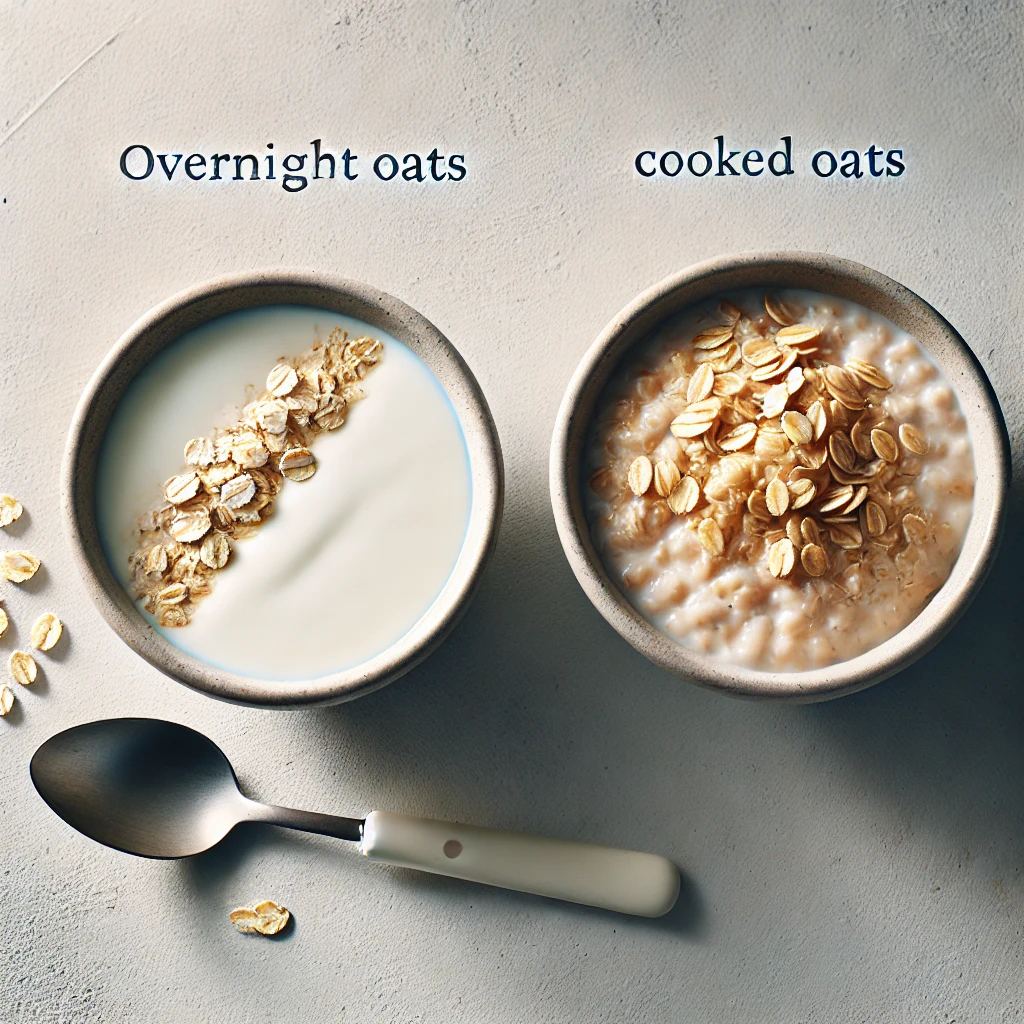Oats are a nutritious and versatile breakfast staple, enjoyed in a variety of forms. Two popular ways to prepare them are as overnight oats or cooked oats. But is there a difference in their health benefits? In this article, we’ll compare the two to determine which method is healthier.
What Are Overnight Oats?
Overnight oats are prepared by soaking oats in liquid (such as milk, almond milk, or Greek yogurt) overnight. This method softens the oats without requiring cooking. The next morning, you’ll have a creamy, ready-to-eat breakfast that can be eaten cold or warmed up.
The beauty of overnight oats lies in their convenience—perfect for busy mornings or those who enjoy meal prepping. For more ideas on healthy, prepped breakfasts, check out this guide on best healthy filling breakfast options.
What Are Cooked Oats?
Cooked oats, on the other hand, are made by simmering oats in water or milk. They result in a warm, hearty breakfast with a smooth, porridge-like texture. While both types of oats offer similar nutrition, the method of preparation can affect factors like texture, taste, and digestion.
For another warm and comforting breakfast idea, consider trying this healthy breakfast curry recipe.
Nutritional Comparison of Overnight and Cooked Oats
Both overnight oats and cooked oats are packed with fiber, protein, and complex carbohydrates. However, because overnight oats are not exposed to heat, they tend to retain more vitamins and antioxidants. Additionally, overnight oats contain more resistant starch, which is a type of fiber that helps with digestive health and feeds beneficial gut bacteria.
If you’re interested in further boosting your gut health, try adding fiber-rich ingredients like chia seeds or flaxseeds to your oats. You can explore more about digestion and oats in this guide on fiber benefits.
Digestibility and Satiety
One of the main benefits of overnight oats is that they are often easier to digest due to the soaking process. Soaking breaks down phytic acid, which can interfere with nutrient absorption. This makes overnight oats gentler on the stomach and more nutrient-dense.
Cooked oats can still provide plenty of satiety, especially when paired with protein-rich toppings like nuts, Greek yogurt, or seeds. However, overnight oats may have the edge in terms of supporting gut health and nutrient absorption. If you’re looking to experiment with more oat-based recipes, check out this article on savory oats.
Blood Sugar and Energy Levels
The way you prepare your oats can also affect your blood sugar. Cooked oats tend to have a higher glycemic index, meaning they may cause a quicker rise in blood sugar. This isn’t necessarily a problem, but for those looking to manage their blood sugar levels, overnight oats may offer a better option. The slow release of carbohydrates in overnight oats, especially when combined with chia seeds or Greek yogurt, helps to maintain steady energy throughout the day.
If you’re trying to manage your blood sugar, you might also find our tips on healthy green juice recipes helpful for complementing your breakfast choices.
Taste and Texture
One of the biggest differences between overnight oats and cooked oats is texture. Overnight oats have a creamy, chewy texture and are usually eaten cold, while cooked oats have a warm, porridge-like consistency. Both are customizable with a variety of toppings, such as fruit, nuts, and honey.
If you’re looking for more inspiration to customize your oats, consider trying the best toppings for toast for ideas that also work well with oats.
Convenience and Meal Prep
When it comes to convenience, overnight oats are the clear winner. By preparing them the night before, you can have a nutritious breakfast ready in the morning with no additional cooking required. This makes them an ideal choice for people with busy schedules or those who like to meal prep.
Cooked oats may take longer to prepare, but they can also be made in large batches and reheated throughout the week. If you enjoy the warmth and texture of cooked oats, this method can still be convenient.
FAQs
Which is healthier: overnight oats or cooked oats?
Both are healthy, but overnight oats may retain more nutrients, such as vitamins and antioxidants, since they are not exposed to heat.
Do overnight oats help with digestion?
Yes, the soaking process helps reduce phytic acid, making overnight oats easier to digest and improving nutrient absorption.
Can you heat overnight oats?
Yes, overnight oats can be warmed if you prefer a hot breakfast, though they are typically eaten cold.
Are cooked oats more filling than overnight oats?
Both can be filling due to their fiber and protein content. Adding ingredients like chia seeds or Greek yogurt to either version can increase satiety.
Both overnight oats and cooked oats have their own set of benefits, and the best option depends on your personal preferences and lifestyle. Overnight oats are a great choice for convenience and digestion, while cooked oats offer a warm, hearty option. Either way, oats are a nutritious way to start your day, especially when paired with healthy toppings like nuts, fruits, and seeds. For more ideas on how to make your breakfast even healthier, check out these fiber-rich breakfast recipes.
This version includes internal links to relevant Foodtira content, optimizing for SEO and providing readers with additional helpful resources.



